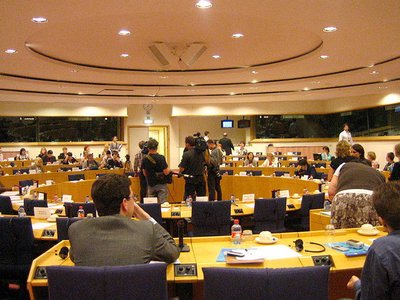
An alliance promoting work-life
balance and social cohesion in Europe reiterated its call for work-free Sundays
at a conference in Brussels, Belgium, last month.
The European Sunday Alliance, a
coalition of national Sunday alliances, trade unions, civil society
organizations and faith communities established in 2011, is gaining some traction
in the European Parliament but continues to trouble religious liberty
advocates.
At the Second Conference on
Work-Free Sundays and Decent Work, the alliance launched a pledge targeting
current and future members of the European Parliament, asking lawmakers to
promote legislation that “respects” Sunday as a “day of rest” and guarantees
fair work hours.
![An alliance promoting work-life balance in Europe is lobbying members of the European Parliament to endorse work-free Sundays in the continent. Above, a committee room of the European Union in Brussels, Belgium. [photo: Wikimedia Commons]](https://adventistreview.org/wp-content/uploads/2022/01/sundayalliance.jpg) “A work-free Sunday and decent
“A work-free Sunday and decent
working hours are of paramount importance for citizens and workers throughout
Europe,” a document distributed by the alliance said, adding that extending the
workweek to “late evenings, nights, bank holidays and Sundays” is jeopardizing
the health, safety, family and private lives of employees.
The alliance also argues that a
longer workweek with fewer holidays isn’t the answer to Europe’s entrenched
financial woes—instead it favors job creation and competiveness.
“Competitiveness needs innovation,
innovation needs creativity and creativity needs recreation,” the document
states.
Economic arguments aside,
religious minorities in Europe—among them Muslims, Jews and Seventh-day
Adventists—worry the proposal could infringe on free expression of religious
beliefs, despite its seemingly well-intentioned goals of reducing stress and
overwork.
“Millions of European citizens
belonging to religious minorities could be affected by [the] EU Sunday Law
aspirations,” said Liviu Olteanu, director of Public Affairs and Religious
Liberty for the Adventist Church’s Inter-European Division (EUD).
In a January 21 news release, the
EUD endorsed the position of Hannu Takkula, a Finnish member of the European
Parliament who has spoken out against work-free Sundays.
“Legislation must never
discriminate on religious grounds. A law setting up Sunday as the universal
work-free day would do just that,” Takkula said in a recent news release.
“Freedom of religion and belief is
a core European value. … The European Union must guarantee everyone equal
rights and freedoms to celebrate the rest day of their convictions,” he
added.
John Graz, General Conference Public
Affairs and Religious Liberty director,
said he was pleased that Takkula and other Parliament members are taking
a clear stand against work-free Sundays.
“We encourage all lawmakers in
Europe to protect the rights of all people of faith, including those who do not
observe Sunday as a day of rest,” Graz said.
Adventists in Europe have
questioned the effects of work-free Sundays since the European Sunday Alliance
was established.
In 2011, Raafat Kamal, Public
Affairs and Religious Liberty director for the Adventist Church in Northern
Europe, said Adventists “support the notion that people need a day of rest to
achieve a work-life balance,” but “at the same time, we want to be sure that
those who don’t observe Sunday as a designated religious day of rest will be
respected.”
Now, Olteanu is directly calling
on members of the European Parliament “not to interfere in matters relating to
religious liberty and freedom of conscience, proposing or accepting laws that
affect the religious liberty of religious minorities.”
Olteanu encouraged Adventist
Church members in Europe to pray for the situation and contact their respective
Members of Parliament or MEP candidate to lobby for their religious
liberties.
“We should commit ourselves with wisdom,
balance and [a] positive attitude to be ambassadors of liberty, hope and peace,
loving others but looking always to promote and defend religious liberty for
all people,” Olteanu said.